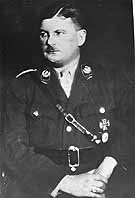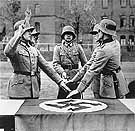
|
|
|

|

|

|

|
|
Click on an image to see a larger, more detailed picture.
|
|
|
|
|
| 1934: Triumph of the Will |

|
pg. 81 |

|
|
|
|
| |
 Flanked by Army officers, Paul von Hindenburg, twice elected president of the Weimar Republic, lies in state in his simple room at Neudeck, East Prussia. With the death of the 87-year-old president on August 2, Hitler moved immediately to claim absolute power as Führer. Senile and under the sway of advisors, the field marshal and hero of the Battle of Tannenberg had proven no match for his ambitious chancellor.
Flanked by Army officers, Paul von Hindenburg, twice elected president of the Weimar Republic, lies in state in his simple room at Neudeck, East Prussia. With the death of the 87-year-old president on August 2, Hitler moved immediately to claim absolute power as Führer. Senile and under the sway of advisors, the field marshal and hero of the Battle of Tannenberg had proven no match for his ambitious chancellor.
Photo: UPI/Corbis-Bettmann
|
 Among the earliest of Hitler's supporters, Ernst Röhm proved a threat to Hitler's goal of seizing power through political means. Röhm joined the 1923 Munich Beer Hall Putsch, but he left Germany in disappointment two years later. Success in the 1930 elections led Hitler to send for Röhm and appoint him SA chief of staff. Röhm proved a formidable leader, transforming the Storm Troopers into a vicious force, controlling the streets by terror. The Nazis' political victories made Röhm expendable. His vision of a soldier's state uniting the Army with the SA alarmed military leaders, who pressured Hitler to eliminate him.
Among the earliest of Hitler's supporters, Ernst Röhm proved a threat to Hitler's goal of seizing power through political means. Röhm joined the 1923 Munich Beer Hall Putsch, but he left Germany in disappointment two years later. Success in the 1930 elections led Hitler to send for Röhm and appoint him SA chief of staff. Röhm proved a formidable leader, transforming the Storm Troopers into a vicious force, controlling the streets by terror. The Nazis' political victories made Röhm expendable. His vision of a soldier's state uniting the Army with the SA alarmed military leaders, who pressured Hitler to eliminate him.
Photo: United States Holocaust Memorial Museum Photo Archive
|
 Placing one hand upon the Nazi flag and raising the other in obedience, these German soldiers swear their allegiance to the Führer. With President Paul von Hindenburg's death, Hitler consolidated power by joining the offices of chancellor and president. He solidified his position by requiring that all soldiers swear a personal oath of loyalty to him as Führer.
Placing one hand upon the Nazi flag and raising the other in obedience, these German soldiers swear their allegiance to the Führer. With President Paul von Hindenburg's death, Hitler consolidated power by joining the offices of chancellor and president. He solidified his position by requiring that all soldiers swear a personal oath of loyalty to him as Führer.
Photo: SYddeutscher Verlag Bilderdienst/United States Holocaust Memorial Museum Photo Archive
|
|

|

|

|

|
 June 14-15, 1934: In Venice, Hitler and Italy's dictator, Benito Mussolini, meet to discuss the fate of Austria.
June 14-15, 1934: In Venice, Hitler and Italy's dictator, Benito Mussolini, meet to discuss the fate of Austria.
|
 June 30, 1934: Hundreds of actual and presumed opponents of the Hitler regime, including many high-ranking officers of the Nazi Storm Troopers (SA), are rounded up and executed in what will come to be called the "Night of the Long Knives." Victims include Ernst Röhm, chief of the SA, and Gregor Strasser, former Reich organization leader of the Nazi Party.
June 30, 1934: Hundreds of actual and presumed opponents of the Hitler regime, including many high-ranking officers of the Nazi Storm Troopers (SA), are rounded up and executed in what will come to be called the "Night of the Long Knives." Victims include Ernst Röhm, chief of the SA, and Gregor Strasser, former Reich organization leader of the Nazi Party.
|
 June 30, 1934: Nazi persecution of homosexuals begins in earnest.
June 30, 1934: Nazi persecution of homosexuals begins in earnest.
|
 July 4, 1934: An Inspectorate of Concentration Camps is established, headed by Theodor Eicke.
July 4, 1934: An Inspectorate of Concentration Camps is established, headed by Theodor Eicke.
|
 July 10, 1934: The Polish antisemitic organization Ob<ó>z Narodowo-Radykalny is banned by Polish leader Marshal Jozef Pilsudski, three months after its formation.
July 10, 1934: The Polish antisemitic organization Ob<ó>z Narodowo-Radykalny is banned by Polish leader Marshal Jozef Pilsudski, three months after its formation.
|
|
|
|
|
| 1934: Triumph of the Will |

|
pg. 81 |

|
|
The Holocaust Chronicle
© 2009 Publications International, Ltd.
|
|
